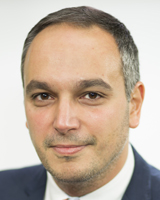MPIfG and Sciences Po a Big Success

 MaxPo
MaxPo
The Max Planck Sciences Po Center on Coping with Instability in Market Societies (MaxPo), which was inaugurated in 2012, will continue its research work through 2022.
After an evaluation process, MaxPo's funding was enthusiastically renewed for a further five years. An outgrowth of many years of collaboration between the MPIfG in Cologne and Sciences Po in Paris,
MaxPo examines the impact of increasing liberalization, technological advances, and cultural change on the stability of industrialized Western societies.
The center is funded in equal parts by the Max Planck Society and Sciences Po and was originally funded for five years. With its Max Planck Centers, the Max Planck Society aims to facilitate exchange between Max Planck Institutes and their international partners and achieve research results with a combination of complementary methods and new topics.
Welcome to Sciences Po's 14 new faculty members
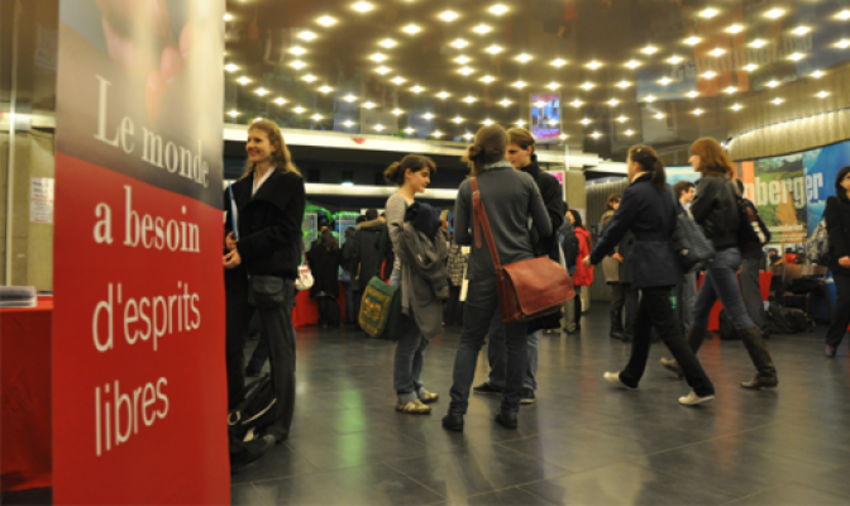
 14 nouveaux chercheurs à Sciences Po (2015-2016)
14 nouveaux chercheurs à Sciences Po (2015-2016)
This year Sciences Po once again continued its ambitious efforts to strengthen its research community.
Fourteen researchers and professors joined our research units and teaching staff: Régis Bismuth, Dominique Cardon, Thomas Chaney, Bruno Cousin, Laurent Fourchard, Romain Lachat, Patrick Le Bihan, Giacomo Parrinello, Benoît Pelopidas, Eduardo Perez-Richet , Camille Roth , Julie Saada, Marie-Laure Salles-Djelic et Éric Verdeil. Profiles:
In Law
Régis Bismuth
University professor Régis Bismuth has joined the Law School. He holds a Masters in Law (LL.M.) from Columbia Law School, a PhD in international law (Paris 1 Panthéon-Sorbonne) and agrégation in public law, and has completed training in finance (Paris-Dauphine and ESCP).
His research mainly focuses on international public law, economic integration law (WTO, international investments, currency), financial regulation, international litigation and animal rights. He explores subjects such as sovereign debt, international standardization, state capitalism, international economic sanctions, regulation of the Internet, and freedom of the press.
For more information
 Julie Saada
Julie Saada
University professor Julie Saada has joined the Law School. She holds an agrégation and accreditation to supervise research (HDR) in philosophy (École normale supérieure de Lyon).
She is an expert in the philosophy of law and in modern and contemporary political philosophy, and has a particular interest in the philosophy of international law, in criminal justice, in ethics and in war and post-war law. She is also working on critical legal theory.
In Economics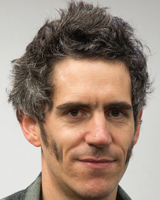
Thomas Chaney
University professor Thomas Chaney has joined the Economics Department. He holds a PhD in economics (Massachusetts Institute of Technology) and is a member of the Center for Economic Policy Research (CEPR).
He was previously a professor at the Toulouse School of Economics and at the University of Chicago, and has been a visiting researcher at many leading international universities, including Princeton University, Yale University, and the London School of Economics. His research focuses on international trade, finance and their underlying networks. He has been awarded an ERC starting grant, entitled “Firm Networks Trade and Growth”.
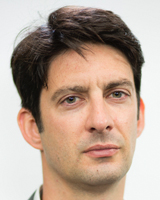 Eduardo Perez-Richet
Eduardo Perez-Richet
Eduardo Perez-Richet holds a PhD in economics (Stanford) and has joined the Economics Department as Associate Professor. He is a member of the Center for Economic Policy Research (CEPR).
He has taught at Polytechnique, Columbia University and Stanford. He has also been awarded the Banque de France’s Prix du jeune chercheur en économie (prize for young researchers in economics).
His research focuses on the information economy, political economy, game theory and social networks. Current interests include the design of information environments, the transmission of verifiable information and the modelling of solidarity networks and their interaction with redistributive public policies.
In History
 Giacomo Parrinello
Giacomo Parrinello
Giacomo Parrinello holds a PhD in history, law and geography (University of Siena) and is joining the Centre and the History Department as an Assistant Professor.
He has taught and pursued research at the Rachel Carson Center for Environment and Society (Munich), Louisiana State University (Baton Rouge) and Institute of Social Ecology (Vienna) as a Marie Curie Fellow. He has received many awards for his book “Fault Lines Earthquakes and Urbanism in Modern Italy”, contributing to innovation in the field of environmental history, and particularly urbanization and industrialization as ecological, social and political transformations. He holds a Chair of excellence from Sorbonne Paris Cité on the interaction between societies and nature on the Mediterranean coast.
In Political science
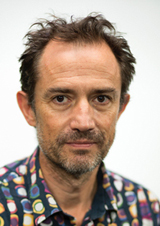 Laurent Fourchard
Laurent Fourchard
Laurent Fourchard has joined CERI as FNSP research director. He holds a PhD in history (Paris Diderot) and an accreditation to supervise research (HDR) in political science.
He previously led the Institut français de recherche en Afrique (IFRA – French institute for research in Africa) in Nigeria, was a researcher at the "Les Afriques dans le monde" (Africas in the world) research centre (Sciences Po Bordeaux) and a visiting researcher at the University of Cape Town (South Africa). His comparative research at the intersection of history and political sociology focuses on government of and violence and exclusion in African urban and metropolitan areas, especially in Nigeria and South Africa. He has recently completed a research program (ANR) on xenophobic exclusion policies in Africa.
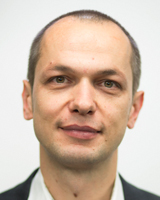 Romain Lachat
Romain Lachat
Romain Lachat holds a PhD in political science and has joined CEVIPOF as Assistant Professor.
After defending his thesis at the University of Zurich, Romain Lachat was a visiting researcher at the University of Montreal, New York University and Pompeu Fabra University, to which he was affiliated.
His research focuses on the comparative analysis of the development of electoral choices by assessing the importance of contextual factors, political programs, ideologies and the impact of candidates’ personal dimension. He is also interested in party competition and has been awarded a Chair of excellence from Sorbonne Paris Cité for his research project in this field.
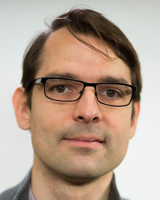 Patrick Le Bihan
Patrick Le Bihan
Patrick Le Bihan has joined CEVIPOF as an Assistant Professor. He holds a PhD in political science (New York University), and was previously a researcher at the Institute for Advanced Study in Toulouse (Laboratoire d’excellence, Université Toulouse I).
He is interested in how different political institutions affect the electorate’s ability to control its representatives and ensure effective representation so that political decisions truly reflect voters’ preferences and not those of elected officials. His research also focuses on the impact of electoral incentives on the functioning of political institutions. He is also interested in comparative political economics.
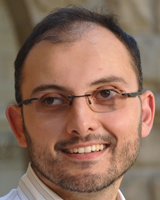 Benoît Pelopidas
Benoît Pelopidas
Benoît Pelopidas holds a PhD in political science (Sciences Po and University of Geneva) and is joining CERI as an Assistant Professor and holder of the chair in security studies.
His work has received two international awards and he has been designated “British Academy Rising Star” in 2016.
Before joining us Benoît Pelopidas taught at the University of Geneva, the Monterey Institute for International Studies and Bristol University; he has been a researcher at, and remains affiliated to, Stanford (CISAC) and Princeton (Science and Global Security) universities.
His research focuses on the formulation, circulation and legitimation of knowledge related to nuclear weapons, and their ethical and political effects within the nuclear community and beyond, particularly in France.
For more information
In Sociology
 Dominique Cardon
Dominique Cardon
Sciences Po graduate Dominique Cardon holds a PhD in sociology (Paris-Est Marne-la-Vallée University) and is joining the médialab as Associate Professor.
He was previously a researcher at Orange Labs (Laboratory des usages), and taught media and digital sociology at Paris-Est Marne-la-Vallée University.
His research focuses on the link between new technologies and social, political and cultural practices. He studies forms of knowledge socialization, production and dissemination, and of public expression through new media – social networks, blogs, wiki, etc. He analyses the political dimensions of the digital: open data, alternative media, citizen initiatives, etc. Last, but not least, he is committed to uncovering how algorithms subvert our lives.
For more information
Bruno Cousin
Bruno Cousin holds a PhD from Sciences Po and the University of Milan-Bicocca and joinsthe CEE as an Assistant Professor of sociology. After completing post-doctoral research at Harvard University he worked as a lecturer at Lille 1 University for six years.
His research concerns the sociology of global cities and of major European metropolises, the sociology of upper classes and inequalities, and the analysis of relations to social and ethnic diversity. Through surveys conducted in different areas (former and new bourgeois neighbourhoods, networks and institutions of elite socialization, etc.), he examines the different modes and dynamics of upper class rejection of local diversity.
 Camille Roth
Camille Roth
Camille Roth joins the médialab as an Associate professor. He holds an engineering degree from the Ecole Nationale des Ponts et Chaussées and a PhD in social sciences (École Polytechnique), and is a CNRS researcher in computer science.
Drawing on his dual skills in the social sciences and in the hard sciences, he founded and headed the “Digital humanities / computer social sciences” hub at the Marc Bloch Centre (Berlin), of which he is still a member.
He has also carried out long research stays abroad (United States, Italy, Great Britain) and is affiliated with various French and international research bodies.
His research focuses on knowledge networks, socio-semantic dynamics, analysis of bodies of texts, complex social systems, public digital space, scientific communities and human mobility.
Marie-Laure Salles-Djelic
University professor, Marie-Laure Salles-Djelic has joined the CSO and serves as co-director of the School of Innovation and Management, which Sciences Po recently launched. She holds a PhD in sociology (Harvard University) and an honorary doctorate from Stockholm University.
She was previously professor of management at ESSEC, where she served as Dean of the Faculty and Director of the Centre de Recherche sur le Capitalisme, la Globalisation et la Gouvernance (C2G2 – Research Centre on Capitalism, Globalization and Governance). She has also completed many academic stays abroad, in Switzerland, in Sweden, in Italy (Bocconi) and in the United States (Stanford).
Her research focuses on the interface between the business/economic world and society. She has published on the transformations of capitalism, the role of transnational networks in the dissemination of ideas and of practices, and on the dynamics of transnational economic governance.
For more information
 Éric Verdeil
Éric Verdeil
University professor, Éric Verdeil joins the CERI, Centre for international studies. He holds a degree in urbanism, an agrégation and PhD in geography, where he examined the reconstruction of Beirut. In Beirut, he also headed the Observatoire urbain (urban observatory) of the Institut français du Proche-Orient (French Institute for the Near East) and taught at the Lebanese University. He then joined the Environnement Ville Société (environment, city, society) (Lyon) and the Techniques, Territoires et Sociétés (techniques, territories and societies) (University of Paris-Est) research centres as a CNRS research fellow.
While empirically drawing on the example of Arab cities, his work adopts a global and comparative approach. His research delves into the sociology and history of urbanism, the political ecology of urban infrastructure, and energy issues.
Globalisation provides new resources for nationalism
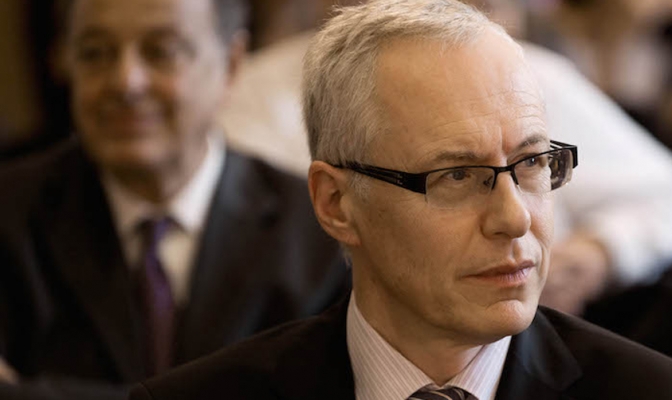
 Photo: Alain Dieckhoff Crédits Sciences Po
Photo: Alain Dieckhoff Crédits Sciences Po
The nation is at once an emancipatory and an exclusionist concept. This is the theme developed by Alain Dieckhoff, CNRS research fellow and director of Sciences Po CERI, in his latest book, Nationalism and the Multination State*. Grounding his analysis in the history of the nation-state, Dieckhoff helps us understand the shifting manifestations of the concept and the tensions generated by nationalism. Interview with the author.
Let’s start with a brief reminder of how and when the concept of nationalism emerged. You situate it at the heart of modernity. Can you tell us more about what you mean by this?
Alain Dieckhoff: Nationalism is both an ideology and a political movement that aims to make the nation the focus of collective expression. The word ‘nation’ signifies a human community which shares common characteristics, be they cultural (language, religion, shared history) and/or political (belonging to the same territorialized political community). The term ‘nation’ was first cautiously adopted in the preeminent European languages of the 18th century, and then firmly took hold elsewhere in the following century. This means that nationalism is a modern phenomenon embedded in a major transformation: when political sovereignty became vested in the people, rather than in monarchs.
How do you explain that nationalism has switched from a ‘positive’ connotation, synonymous with freedom and emancipation, to a ‘negative’ connotation, synonymous with exclusion and withdrawing into oneself?
Because the idea of nation was at odds with the unequal society of the Ancien Regime, it was inseparable from the rise of democracy as government by the people. Nationalism originally had a truly revolutionary and emancipatory dimension. From the Peoples’ Spring in 1848 through to the 1950-60s great wave of decolonization and up to the ‘decommunisation’ of peoples under Soviet rule in the 1990s, it was this emancipatory aspect of nationalism that was clearly at the forefront.
Selling the Future

 Selling the Future. The Perils of Predicting Global Politics
Selling the Future. The Perils of Predicting Global Politics
Ariel Colonomos, CNRS Research Professor at CERI Sciences Po publishes "Selling the Future. The Perils of Predicting Global Politics" (Hurst / Oxford University Press, July 2016).
In his investigation of the paradoxes of forecasting and future-telling, Ariel Colonomos interrogates today’s knowledge factories to reveal how our futures are shaped by social scientists, think-tanks and rating agencies. Interview
From "Moralizing International Relations" (Palgrave Macmillan, 2008) to "The Gamble of War" (Palgrave Macmillan, 2013), you have now chosen to focus on future telling and how this activity actually plays a role in our present and future. Can you tell us more about your research path? What lead you to work on anticipation and future telling?
Ariel Colonomos: In my book "Moralizing International Relations", I focused on the interpretation and the explanation of a dynamic that seemed to me very characteristic of the post-Cold War era and the 1990s. States and other institutions were “called to account” because of their past or present wrongdoings. They were obliged to look into their past in order to move into the future. There was, to me, a need to understand the reasons for this phenomenon and to measure its consequences, notably in normative and ethical terms. In the book that followed ("The Gamble of War"), I focused on the years in the aftermath of 9/11 which initiated a movement that characterized the 2000s, and to some extent is still one of the landmarks of the period we currently live in. In the face of attacks where civilians were being killed on their own soil, Western states started to engage in preventive action. By doing so, they made bets about the future. Preventive action is based on anticipation and therefore is a gamble. Striking first is justified by the assumption that inaction will be too costly and that the use of force will impede future attacks on the part of an opponent whose intentions are hostile and who has developed its lethal capacities. This has very important military, political, legal, moral implications and consequences that need to be accounted for. Through this study, I discovered the importance of anticipations that lie at the core of prevention. In order to make preventive bets and therefore actually ‘Gamble on War,’ states need to make claims about the future. This is what led me to writing "Selling the Future"...
Johannes Boehm awarded
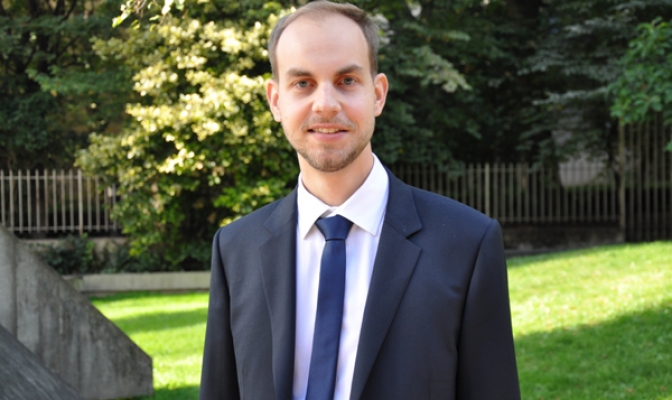
 Johannes Boehm
Johannes Boehm
Joahnnes Boehm, who joined our Department of Economics in 2015 was awarded the prize for his paper: The Impact of Contract Enforcement Costs on Outsourcing and Aggregate Productivity
The Young Economist Awards are decided by the Board of Administration of the Austrian Economic Association and awarded at their annual conference to researchers who have accomplished outstanding research under the age of 35.
Johannes Boehm, Assistant Professor at SciencesPo, is specialized in macroeconomics, international trade and industrial organisation.
His paper studies how the cost of enforcing supplier contracts shapes the boundaries of firms, and how much this matters for a country's level of development. In countries where the courts are slow and expensive, firms outsource relatively less when they rely heavily on formal enforcement of the sourcing contracts. This, in turn, lowers their productivity. A quantitative exercise reveals that some developing countries suffer badly due to these mechanisms, and could benefit substantially from improving the speed and efficiency of their courts.
The newsletter of the Research at Sciences Po

 Cogito, la lettre de la recherche à Sciences Po
Cogito, la lettre de la recherche à Sciences Po
At the heart of Sciences Po's Research
The launch of Cogito has one main purpose: to share our most recent research findings and new projects with you. It was not easy to choose from our community’s rich activity. The report featured in this issue – on migration in Europe – was an obvious choice given how much the subject is currently dominating the news. We believe that the publications, research projects, young researcher profiles and unexpected data presented in this first issue are emblematic of the work to which our research community is passionately devoted. Along with all the people who put so much energy into producing this Cogito I hope you will enjoy the read and find it thought provoking!
20th conference of the SIOE
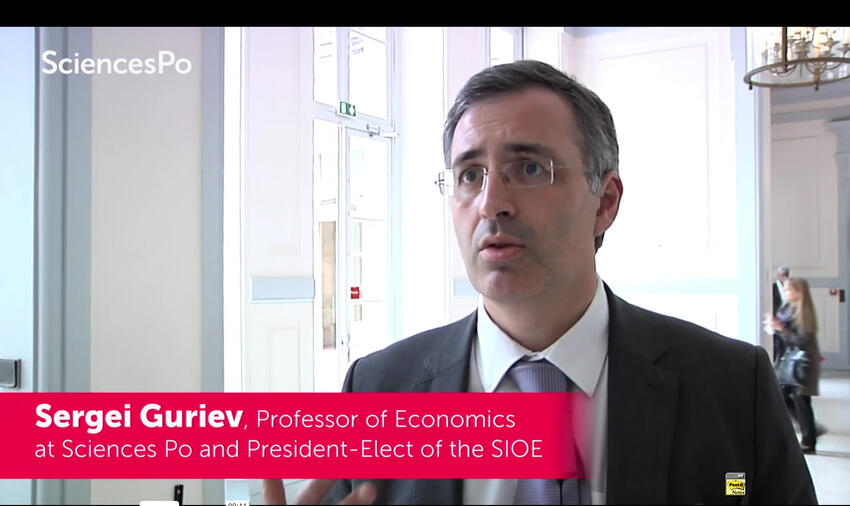
 20th conference of the SIOE - Sergei Guriev.
20th conference of the SIOE - Sergei Guriev.
The Department of Economics and the LIEPP are proud to have supported the organisation of the 20th Annual Conference of Society for Institutional & Organizational Economics (SIOE) which has been held at Sciences Po from June 15th to June 17th 2016.
The conference has attracted high quality papers from an international community of scholars in many disciplines including economics, political science, sociology, management, history, and law. 300 participants from all across the world have attended and covered 251 selected papers.
The Social Effects of Ethnic Diversity

 @ Still from Norman McLaren's 1952 short film "Neighbours"
@ Still from Norman McLaren's 1952 short film "Neighbours"
“One of the most significant challenges that modern societies face, and at the same time one of our greatest opportunities, is the growing ethnic and social diversity in most developed countries”. Robert Putnam (2007).
The notion of diversity refers to the fact that members of a community differ in certain characteristics linked to ethnic origin, socio-economic status and culture. With increasing commerce, economic integration and migration, the degree of diversity within modern societies grows ever greater. Understanding the impact of ethnic diversity on the economy in a broad sense, but also on social relations and living conditions, has become a priority. Numerous university studies sometimes demonstrate a negative relationship between ethnic diversity and growth, the quality of public goods and confidence, and a positive relationship between diversity by country of origin and wealth and productivity. However, these studies, conducted at a relatively aggregate geographic level, do not grasp precisely the mechanisms involved.
In this article, Yann Algan, Camille Hémet and David Laitin study the effect of diversity on the well-being and satisfaction of individuals vis-a-vis their housing conditions. They use a highly localised, micro-geographical approach, observing public housing blocks, allowing them to pursue their enquiries in the light of social relations between neighbours. In the French system, social housing (HLM) is allocated without regard for ethnic origin or individual diversity preferences. The authors use this feature, which from a methodological point of view, they contextualise as a “natural experiment” and permits them to consider the level of diversity of a given HLM quarter as exogenous. In other terms, this article offers a causal analysis between the decrease or growth in the level of diversity and different social indicators. The results are mixed. On one hand, the lack of credible social sanctions and of collective action in more diverse neighborhoods leads to a lower quality of the commons, such as basic equipment, for which proprietors and property managers are responsible (for example, central heating systems and lifts). On the other hand, they find no significant impact of diversity on attacks, criminality or violence in the neighborhood, translated as more indifference than enmity between neighbors . The key open question is how public policy could build social capital in such a context.
Algan, Laitin and Hémet propose an over-arching and convincing interpretation of these concurrent results that promises a new avenue for research and policy-making.
To find out why, read their paper published in The Journal of Political Economy (University of Chicago Press) “The Social Effects of Ethnic Diversity at the Local Level: A Natural Experiment with Exogenous Residential Allocation” (earlier, ungated version, PDF, 472 Ko)
More about Yann Algan and his research (link)
@ Still from Norman McLaren's 1952 short film "Neighbours"
Nicolas Coeurdacier
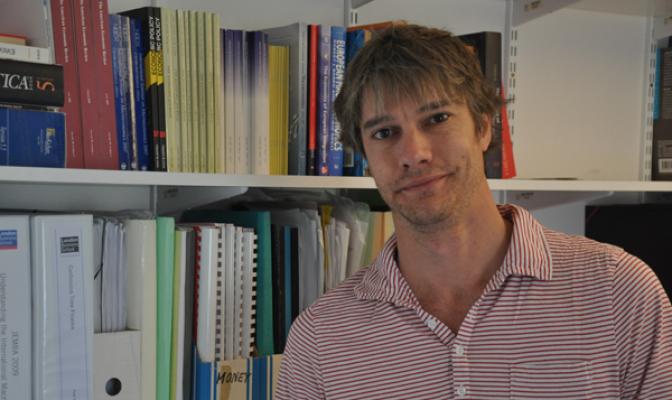
 Nicolas Coeurdacier. Crédits : Sciences Po
Nicolas Coeurdacier. Crédits : Sciences Po
Inspired by the American Economic Association’s John Bates Clark Medal, Le Monde, French daily, and the Cercle des économistes, created the prize in 2000, with a twofold objective: to highlight the work of France’s best young economists (under 41) who have contributed significantly to economic thought and knowledge and to make better known the multiple facets of economic science.
Nicolas Coeurdacier, Professor at SciencesPo and CEPR Research Fellow, was nominated for his research on international financial integration and capital flows. Coeurdacier’s work has led him to take a second look at classic economic theory that holds that capital should flow towards to countries/regions where economic growth is strongest. This theory flies in the face of observed phenomena of the past 20 years, and notably the behaviour of China that has massively invested in economically developed countries but in which growth has been slow.
The nomination of Nicolas Coeurdacier as « Meilleur Jeune Économiste » is the latest in an already impressive line of consecration of his research - notably an ANR Chaire d’Excellence grant for a 3-year project on International Portfolios and Risk-Sharing (2010-13), and an ERC Starting Grant his project «Within and across countries Heterogeneity in International Finance (INFINHET) » (2014-18). Last autumn, he co-authored with Department colleague Stéphane Guibaud and Keyu Jin (LSE) a paper that was published in the prestigious American Economic Review (link to interview).
This nomination is also the latest in a long line of laureates (4) and nominees (3) who are faculty members at the Department: Philippe Martin (laureate ex aequo 2002), Thierry Mayer (laureate ex aequo 2006), Etienne Wasmer (laureate ex aequo 2006), Yann Algan (laureate ex aequo 2009), Alfred Galichon (nominated 2010), Guillaume Plantin (nominated 2011), Elise Huillery (nominated 2014).
More about Nicolas Coeurdacier and his research
Link to Le Monde interview with N. Coeurdacier (May 23rd, 2016) – in French
Link to the Cercle des économistes “Prix du Meilleur Jeune Économiste” webpage - in French
Algeria.From Opacity to Complexity
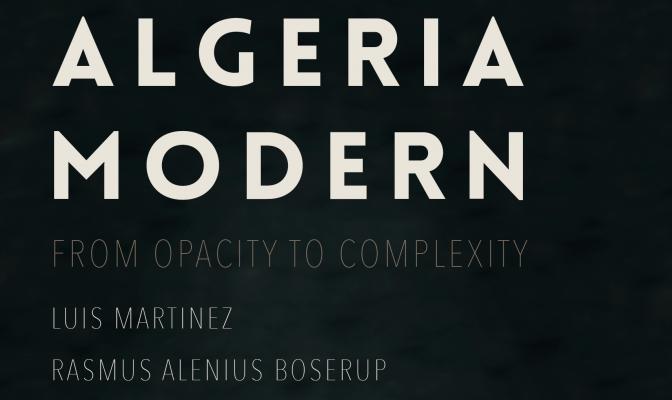
 Algeria Modern From Opacity to Complexity
Algeria Modern From Opacity to Complexity
Interview with Luis Martinez (CERI Sciences Po) and Rasmus Alenius Boserup (DIIS), authors of Algeria Modern. From Opacity to Complexity, London, Hurst Publishers/CERI Sciences Po, April 2016
U Multirank recognises Sciences Po's strong performance for research and international orientation

 U-Multirank 2016
U-Multirank 2016
U Multirank has just released its university rankings for 2016. Sciences Po has obtained excellent scores for its international orientation and research. U Multirank was launched in 2014 by the European Commission as a means to compare universities based on a number of different criteria, making it an interesting alternative to the most well-known rankings.
As far as research is concerned, U Multirank 2016 emphasises the international dimension of our research and notes that nearly 45 percent of our publications are the product of collaboration with researchers from partner universities. Jointly supervised PhDs, which are also frequent, contribute to the international nature of doctoral programmes at Sciences Po.
Moreover, the U Multirank results underscore the influence and quality of research conducted at Sciences Po. The work of our researchers is widely cited in the scientific literature (highest score for the citation rate of their publications). As a further indication of the quality of our research, U Multirank places Sciences Po in the top category of institutions in terms of the ability of our academics to win prestigious grants (European Research Council, National Research Agency, etc.).
Sciences Po ranks fourth for Politics & International Studies
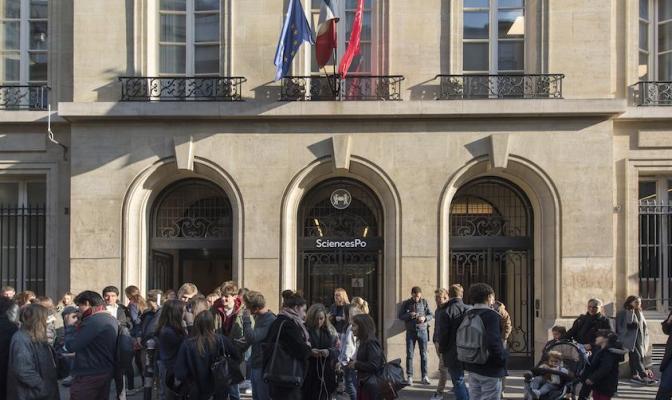
 Sciences Po
Sciences Po
The 2016 QS World University Rankings by subject have just been released! Once again, Sciences Po’s academic excellence has been recognised.
This year’s ranking puts Sciences Po in fourth place for Politics & International Studies, alongside Harvard University, Oxford University and the London School of Economics, and just ahead of the University of Cambridge. Sciences Po has risen nine places in this discipline since the 2014 QS ranking. In France, the university remains the highest ranked in the subject.
Sciences Po has also made remarkable progress in Sociology, ranking 50th internationally, up from a position in the 51-100 category for this discipline last year. The university remains second in France in the subject. Another notable breakthrough has been made in Economics & Econometrics, for which Sciences Po enters the 51-100 category this year, and ranks third in France. The ranking also puts Sciences Po in third place in France for History.
Last but not least, Sciences Po ranks first place in France (40th place internationally) in a newly created category on Social Policy & Administration.
----
March 22nd, 2016
A Brief History of Human Time

 @Kristian Bjornard/CC-BY/FlickR
@Kristian Bjornard/CC-BY/FlickR
Etienne Wasmer, permanent faculty member of the Sciences Po's Department of economics and co-director of LIEPP, has co-authored with Olivier Gergaud (KEDGE Business School and LIEPP) and Morgane Laquenan (LIEPP) the first paper to analyze a very, very, very big database aptly called « A Brief History of Time ».
The paper describes a database of 1,243,776 notable people and 7,184,575 locations associated with them throughout human history (3000 BCE-2015 AD) and then sets out to analyze it.
What are the characteristics of historical individuals or, as the authors prefer, « notable people » ? How can they be mapped, i.e. where are they to be found throughout the course of their own lives and over time? And how may they be associated (or not) to city growth?
The entire story
-----
The Brief History of Time database is the fruit of an intensive two-year institutional collaboration between SciencesPo’s Atelier de Cartographie, médialab and the Laboratory for Interdisciplinary Evaluation of Public Policies, (LIEPP), and the joint effort of Etienne Wasmer, Olivier Gergaud and Morgane Laouenan.
How the IMF did it:

 Board of Governors International Monetary Fund. Credits: Wikipedia
Board of Governors International Monetary Fund. Credits: Wikipedia
In a recent article published in the Capital Markets Law Journal, Jérôme Sgard, researcher at CERI, analyses how the International Monetary Fund (IMF) acted as a third-party in a total of 109 debt restructurings between 41 debtor states and their creditor banks, how this regime emerged through trial and error during the 1970s; and how it was implemented and accounted for and justified after the 1982 Mexican crisis.
Extract:
The saga of Argentina’s debt renegotiations since the 2001 default, followed by the chaotic experience of Greece after 2010, has reminded us how difficult it is to build a sustainable, well-accepted procedure for restructuring sovereign debts. Despite decades, if not centuries of experience, policy makers lack a solid body of principles and guidelines so that, again and again, each time this market is in crisis they are haunted by the same dilemmas. The first one is typically over who may declare that a country’s debt should be restructured, and by which criteria. Next come many more difficult questions about the place or jurisdiction where a settlement may take place, coordination and decision-making among the parties, or the link between a financial settlement and the monitoring of the debtor country’s policy commitments.
Since the mid-1990s this debate has increasingly focused on one subpart of this broad range of issues, namely decision-making among creditors. After the option of a specialized supra-national court was rejected in 2003,1 most contributions have focused on whether, and how...
Using History to Heal

 Appareil respiratoire pour mineurs. Crédits : Pierre-Henry Muller
Appareil respiratoire pour mineurs. Crédits : Pierre-Henry Muller
What if we could improve diagnosis and treatment of a disease by revisiting how our understanding of it—or lack of—evolved over time? This strategy is at the heart of the SILICOSIS project, which by combining medicine and history has already improved the monitoring of patients exposed to specific types of dust particles.
“We saved our first patient!” enthuses historian Paul-André Rosental of the Centre d’Études Européennes de Sciences Po.1 His project SILICOSIS (link is external), launched three years ago, is unusual but promising: it consists in reconstructing the history of diseases in order to diagnose them more easily. The ultimate goal is to use social sciences to help healing. The first success story dates back to 2013, when a man of 78 was admitted to the Avicenne hospital in Bobigny (near Paris) in an emergency, with acute respiratory distress syndrome, a worrying heart condition and an abnormal accumulation of liquid around the lungs and heart. Antibiotics did not help. Dr. Marianne Kambouchner, an anatomic pathologist, was then called upon to analyze biopsies from the patient. As a medical partner in the SILICOSIS project, she was aware of how poorly dust toxicity had been taken into account since the 1930s. So she looked at the case file from another angle...
A sensitive portrait of Lévi-Strauss

 Claude Lévi-Strauss en 1938 en Amazonie © Journal de la Société des Amériques
Claude Lévi-Strauss en 1938 en Amazonie © Journal de la Société des Amériques
Emmanuelle Loyer, historian at Sciences Po, was awarded the 2015 Prix Femina Essai last autumn for her biography of Lévi-Strauss. Drawing on previously unused archives, Loyer’s book explores the career of a peerless figure whose thought was shaped by a keen sense of the senses. Interview.
Claude Lévi-Strauss’s multi-faceted identity is one of the most striking features to appear in your biography. He seems anxious to belong to several eras and several cultures at once.
Emmanuelle Loyer: Indeed, Lévi-Strauss was obsessed by eras that he had not lived in. I attach considerable importance to these pasts that were a part of his makeup; he said he was a man of the nineteenth century and liked the “freshness” of the sixteenth-century perspective. When he went to Brazil, he had Jean de Lery’s Voyage faict en la terre du Brésil in hand. During his fieldwork there he dreamed of that inaugural encounter of modernity between the first "Indian" and the first European, hoping in turn to rediscover, intact, a form of amazement....
Give recovery a chance

 credits : StockMonkeys.com
credits : StockMonkeys.com
By OFCE (Sciences Po) in cooperation with IMK (Germany), ECLM (Denmark) and AK Wien (Austria)
The independent Annual Growth Survey (iAGS) brings together a group of internationally competitive economists to provide an independent alternative to the Annual Growth Survey (AGS) published by the European Commission. The iAGS is published simultaneously with the Annual Growth Survey of the European Commission at the start of the European semester.
The iAGS seeks to irrigate and inform the public debate on economic strategy in Europe. Sustainability of public debt, fiscal adjustment and exit strategies from the recession will be fundamental concerns in years to come. These issues are complex and cannot be addressed with off-the shelf or one-size-fits-all expertise. Instead, an open and in depth analysis of hypotheses, empirical evidence, options and foreseeable consequences of possible policies is required.
Short presentation of the 2015 Issue
The ongoing recovery of the Euro Area (EA) economy is too slow to achieve a prompt return to full employment. Despite apparent improvement in the labour market, the crisis is still developing under the covers, with the risk of leaving long-lasting “scars”, or a “scarification” of the social fabric in the EA. Moreover, the EA is lagging behind other developed economies and regardless of a relatively better performance in terms of public debt and current account, the current low rate of private investment is preparing a future of reduced potential growth and damaged competitiveness.
So far, the Juncker Plan has not achieved the promised boost to investment. The internal rebalancing of the EA may fuel deflationary pressure if it is not dealt with through faster wage growth in surplus countries.
Failure to use fiscal space where it is available will continue to weigh down on internal demand. Monetary policy may not succeed in the future in avoiding a sharp appreciation of the Euro against our trade partners’ currencies. Such an appreciation of the real effective exchange rate of the Euro would lock the EA in a prolonged period of stagnation and low inflation, if not deflation.
A window of opportunity has been opened by monetary policy since 2012. Active demand management aimed at reducing the EA current account combined with internal rebalancing of the EA is needed to avoid a worrying “new normal”. Financial fragmentation has to be limited and compensated by a reduction of sovereign spreads inside the euro area.
Active policies against growing inequalities should complement this approach. Public investment and the use of all policy levers to foster a transition toward a zero carbon economy are ways to stimulate demand and respect the golden rules of public finance stability.
The Climate Negotiations Browser:

 The Climate Negotiations Browser
The Climate Negotiations Browser
In continuation of the EMAPS project, the médialab of Sciences Po, the Laboratoire de Systèmes d'Information Répartis (Switzerland) and the Atelier Iceberg of Nantes have developed a climate change debate exploration platform focusing on deliberations at the highest level of the United Nation Framework Convention on Climate Change (UNFCCC).
The platform aims to assist climate negotiation actors and observers, providing them with the tools required to navigate through the last twenty years of international discussions on climate change:
- A serie of visual diagrams presenting the main actors (countries and negotiating groupings), the stake of negotiations (mitigation, adaptation, Kyoto Protocol, post-Kyoto…) as well as the evolution of their respective and combined visibility over time.
- A search engine allowing users to filter and browse the verbatims of the Earth Negotiations Bulletin
SOWELL, a new ERC
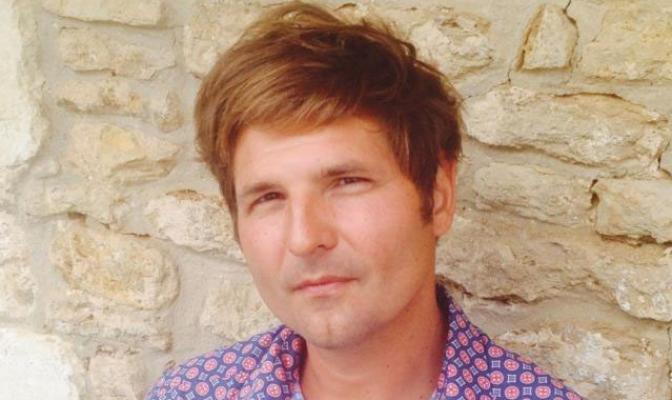
 Yann Algan
Yann Algan
Yann Algan, Professor at the Department of Economics, has been awarded for the second time a grant from the European Research Council (ERC).
Yann Algan was awarded an ERC Starting Grant for his research project TRUST - Culture, Cooperation and Economics at the end of which he was awarded a second grant in the ERC’s « Consolidator » category.
With this new innovative research project, Yann Algan will explore the foundations of our social preferences and well-being through Big Data. In a context in which social cooperation and well-being have become new priorities for our societies alongside that of economic growth, it has become urgent to evaluate their determinants as well as public policies that can develop them.
Based on three main axes, the SOWELL project - Social Preferences, Well-Being and Policy - in its first stage, will seek to rethink the theory and measurement of well-being by calling upon Big Data compiled from Google enquiries, Twitter exchanges, Facebook and other forums. These Big Data indicators of well-being should allow us to, literally, take the pulse of our societies in real-time and at a geographical scale infinitely richer than traditional enquiries that ask a handful of citizens to evaluate their personal life satisfaction on a scale of 0 to 10.
The SOWELL project also aims to develop online platforms that will allow us to study the heterogeneity of social motives in the organization of our societies and thus economic behavior. In the second stage, Yann Algan will use these behavioral measurements on a large scale and the indicators of well-being that emerge from Big Data in order to analyse the economic, historical, social or even psychological determinants of well-being and cooperation.
In the final stage, the project will evaluate public policies that can enhance well-being and foster pro-social behavior among citizens, notably in the field of education with an analysis of public interventions that aim to develop non-cognitive and social skills in early childhood. This analysis will lead to the renewal of the paradigms of the evaluation of economic and public policies by integrating their effects on individual well-being and social progress.
The project will use highly original methods, first by exploiting the opportunity afforded by Big Data to test theories of well-being and social preferences. In collaboration with Sciences Po’s Medialab, an « E-Lab » will be created in order to observe and study well-being and social behaviors in our societies, corporations or schools. This laboratory will also combine experimental protocols of randomized evaluation with behavioral economics in order to study the impact of public policies on non-cognitive and social skills at school, in organizations and in the public space. The results should allow the creation of a new model of evaluation of public policies, based on social preferences and well-being.
The SOWELL Project, led by Yann Algan, will federate researchers from very different disciplines: economics, cognitive sciences, psychology, political science, sociology and anthropology.
Welcome to Sciences Po's 15 new faculty members

 © Blocquaux Vincent / Sciences Po
© Blocquaux Vincent / Sciences Po
This year Sciences Po once again continued its ambitious efforts to strengthen its research community.
Fifteen researchers and professors joined our research units and teaching staff: Loïc Azoulai, Carlo Barone, Philippe Bezes, Alain Chatriot, Marie-Emmanuelle Chessel, Marco Cremaschi, Sabine Dullin, Emanuele Ferragina, Denis Fougère, Sukriti Issar, Hélène Le Bail, Florian Oswald, Jérôme Pélisse, Sébastien Pimont, and Hélène Thiollet.
In Law
- Loïc Azoulai, university professor, joined the Law School faculty in September 2015. He also holds a Chair of Excellence at Paris Sorbonne Cité.Loïc Azoulai received a doctorate in law from the European University Institute (EUI), where he held the Chair in European Law after serving as a professor of public law at Assas-Paris II University and law clerk at the Court of Justice of the European Union. At the EUI he also led the Centre for judicial cooperation and co-led the Academy of European Law.He studies the relations between institutional Europe, its achievements, its law and the individuals they affect
- Sébastien Pimont, university professor, joined the Law School faculty in September 2015.Sébastien Pimont received a doctorate in law from the University of Poitiers and taught at the University of Savoy law school, where he became dean.As a civil lawyer specialised in contract law he conducts research on the law of obligations, consumer law, and property law. He is also developing work on legal education and more broadly on legal theory
In Economics
- Florian Oswald joined the Department of Economics as Assistant Professor in September 2015.Florian Oswald recently received his doctorate from the University College of London. He uses an applied approach to microeconomics to study issues linked to labour economics, consumption and housing.The quality of his research has already been recognized by several international organizations that support research such as the Austrian Academy of Sciences and the Alfred P. Sloan Foundation.
- Denis Fougère, CNRS research director, has joined The Center for Studies in Social Change (OSC).He holds a PhD in economics and was a research professor at the University of Toulouse before becoming a researcher at the Centre for Research in Economics and Statistics (CREST). His first works were awarded a CNRS bronze medal as well as the Hicks-Tinbergen Award from the European Economic Association. In addition to being a member of the Centre for Policy and Economic Research (CEPR) in London and of the Institute for the Study of Labor (IZA) in Bonn, he has served as research advisor to the French Ministry of Education.He focuses on labour and educational economics as well as assessment methods, which he studies from a microeconomic perspective. He is affiliated with Sciences Po’s Interdisciplinary laboratory for the evaluation of public policies, where he co-leads the “Educational Policies” section
In History
- Alain Chatriot, university professor, joined the Centre for History (CHSP) in September 2015.Alain Chatriot holds an agrégation, doctorate and habilité à diriger des recherches (habilitation) in history. He was a research fellow at the CNRS for ten years and has taught at the School of Advanced Studies in Social Sciences (EHESS). In 2009 he was awarded a CNRS bronze medal for his first works.He conducts research in political, social and economic history. He especially focuses on the history of the state, the administration and economic and social policies. His most prominent research includes his work on the Third Republic, the work world and agricultural policies.
- Marie-Emmanuelle Chessel, CNRS research director, joined the Centre for the Sociology of Organizations (CSO) in September 2015.She holds a PhD in history from the European University Institute in Florence (EUI) and has long conducted advanced studies in the social sciences at the school’s centre for historical research.In 2014 she was awarded a CNRS silver medal recognizing the originality and importance of her work both nationally and internationally. Her research focuses on the development of two major social phenomena: the consumer society and the relationships between religion and the economic world. She aims to shed light on how these phenomena spread in France throughout the 20th century, and their links with other Western societies. .
- Sabine Dullin, university professor, joined the Centre for History (CHSP) in September 2015.A graduate of the French Ecole Normale Supérieure, Sabine Dullin holds an agrégation, doctorate and habilité à diriger des recherches (habilitation) in history. She first taught at Paris 1 Panthéon-Sorbonne, and then at Lille 3 - Charles de Gaulle. She is a historian of politics and international relations, specializing in the 20th century history of Russia and Eastern Europe.After working on diplomats and diplomacy during communism and the Cold War, she explored the history of border practices and politics. She is currently conducting research on multiple borders in the context of imperialism, focusing on the experience of the Socialist bloc between 1950 and 1970.
In Political Science
- Philippe Bezes, CNRS research director, joined the Centre for European Studies (CEE) in September 2015.Philippe Bezes holds a doctorate and habilité à diriger des recherches (habilitation) in political science. He is also a graduate of the École Supérieure de Commerce de Paris and holds diplomas of advanced studies (DEA) in philosophy and sociology. To date he has conducted his research at the Centre for studies and research on administrative and political sciences (CERSA, Paris 2, Panthéon Sorbonne - CNRS) and taught the sociology of government agencies, state reform and public policy at Sciences Po. In 2014 the CNRS awarded him a bronze medal recognizing the value of his work. He is an expert in bureaucracies, the state and administrative reform, and his research focuses on the sociology of government agencies and the changes that affect them.
- Hélène Le Bail, CNRS research fellow, joined the CERI in October 2015.Hélène Le Bail holds a PhD in political science and a degree in Chinese. Following a post-doctoral fellowship at Waseda University in Tokyo, she became a researcher at the French Institute for International Relations (IFRI), where she headed the China program. She then pursued her research at the French institute for research on Japan (MAE-CNRS) at the Franco-Japanese House in Tokyo.She is an expert on Asia and more specifically on intra-Asian migration. She focuses on Chinese immigration in Japan, marriage migration and Japanese initiatives to support foreigners. Hélène Le Bail
- Hélène Thiollet, CNRS research fellow, joined the CERI in January 2015.A graduate of the French Ecole Normale Supérieure (ENS-Ulm), Hélène Thiollet holds a diploma in advanced studies (DEA) in geography, and a doctorate in political science. She was a post-doctoral fellow at Oxford, where she pursued her research at the International Migration Institute.She is an expert in international migration and her interests span this issue’s various aspects: public policies, international relations, global governance, international law, development aid, etc. Her research focuses on countries of the South, especially the Middle East and sub-Saharan Africa. With Catherine Withol de Wenden, she co-directs the “Global mobility and governance of migration” (MOBGLOB) project, which is funded by the French National Agency for Research.
In Sociology
- Carlo Barone, university professor, joined the Sociological Observatory of Change (OSC) in September 2015.He received his PhD from the University of Milan Bicocca and was associate professor in the University of Trento’s department of sociology and social research.His research focuses on inequalities, whether they stem from the social environment, gender or origins. He takes a comparative approach between different European countries. He is especially interested in the impact of inequality in educational systems and more specifically in higher education and professional careers. He is also working on the development of new research methods, such as experimental methods in sociology.
- Emanuele Ferragina joined the Sociological Observatory of Change (OSC) and the Interdisciplinary laboratory for the evaluation of public policies (LIEPP) as Assistant Professor in January 2015.He holds a dual Franco-British masters in economics and doctorate in sociology. Emanuele Ferragina received his PhD in sociology from Oxford University, where he was affiliated with the “Social Policy and Intervention” department.His research combines the analysis of social structure with the study of lifestyles and daily concerns. Using a comparative approach, he especially focuses on social policies and their subjects (welfare state, labour market, family policies, etc.) and on the drivers of social capital and socialisation.
- Sukriti Issar joined the Sociological Observatory of Change (OSC) as an Assistant Professor in September 2015.She holds a PhD in sociology from Brown University and was a post-doctoral fellow in the department of political science and international relations at Oxford University.Sukriti Issar is an expert in political economy and institutional transformation. She also focuses on urban governance issues and has worked on the city of Mumbai. Another area of interest is qualitative and quantitative research methods. Many of her articles have already been published in prominent international journals.
- Jérôme Pélisse, university professor, joined the Centre for the Sociology of Organizations (CSO) in September 2015. He holds an agrégation in economic and social sciences and a doctorate in sociology from the University of Marne-la-Vallée, and is a graduate of ENS Cachan. He served as research professor at the University of Reims and then of Versailles Saint Quentin en Yvelines, where he held a CNRS chair of excellence and led the Printemps laboratory. Jérôme Pélisse’s research combines the sociology of labour with the sociology of law, the sociology of professional relations and the sociology of organizations.In various fields – employment policies, corporate professional relations, health and security (especially “nano” risks), labour law usage, legal expertise – he focuses on processes shaping the transfer and appropriation of rights in organizations, as well as how actors relate to the law in everyday work situations.
In Urbanism
- Marco Cremaschi, university professor, joined the Centre for European Studies (CEE) and Urban School, where he leads the “Urbanism” section, in April 2015.An expert in city policies and urbanism, Marco Cremaschi holds a doctorate from the IUAV University of Venice. He served as professor and then researcher at the University of Roma Tre, and has also taught at Pittsburgh and Cornell.His research focuses on the various innovative dimensions of urban planning: strategic plans, local development, and urban projects. Marco Cremaschi is both a leading theoretician and field researcher. He has participated in projects led by public organizations at all levels of government: local (Milan, Palermo), national (ministries) and international (European Union, United Nations). Marco Chermaschi
Beyond preconceived ideas on children of immigrants...
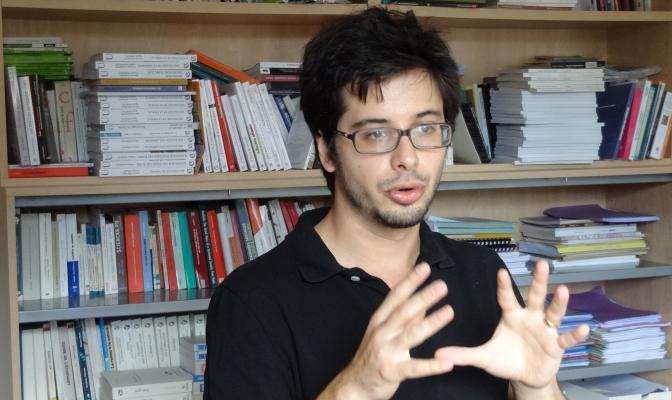
 Mathieu Ichou
Mathieu Ichou
After a visitor scholarship at Nuffield College, University of Oxford, Mathieu Ichou passed successfully his PHD in 2014. He studied sociology at OSC Sciences Po, under the supervision of Agnès van Zanten. The young sociologist combines both traditional sociological method and adaptability to describe a debated multi-faceted reality. He's now research Fellow in the French Institute for Demographic Studies (INED).
In your work you denounce the standard equation of immigration with social problem and education failure
"My thesis on the academic trajectories of children of immigrants attempts to debunk a certain number of prejudices or preconceived ideas on immigration. I think that the most important thing that I try to challenge is the idea that immigration is mainly a social problem.
Immigrants, children of immigrants and immigration in general, especially nowadays but it was the case also a few decades ago, is mostly talked about in the media and by politicians as a problem, something that is only visible as soon and as long as it creates a problem. This premise is not a good starting point in order to study immigration sociologically. In my work, I did not take as a starting point the fact that immigration is a problem and I think it enabled me to make progress on two fronts.
First, it enabled me to decouple children of immigrants and school failure. In fact, what we see in the data is that being a child of immigrants does not overwhelmingly lead to failing at school, or at least, it is not because your parents are immigrants that you are more likely to have lower school results. The vision that equates children of immigrants and school failure fails to see the large heterogeneity that exists within the so called “second generation”.
The second consequence is to show how important it is to consider the parents of these children not only after they have crossed national borders, arrived in France, and become visible here, but also before they migrated. The experiences of the parents and their social characteristics in their country of origin are essential elements to understand and explain the academic trajectories of their children in the country of destination, so in my case in France and in England."
To study trajectories of children of immigrants, are data easily available?
Mathieu Ichou"As it is well known, France forbids the collection of ethno-racial data to large extent. So, one might think that without directly measuring ethnicity it is extremely difficult to quantify the academic trajectories of children of immigrants. I would say that this is only half true because, with existing data, it is already possible to do quite a lot. Like most researchers in this field, the main measure that I have used is the country of birth of children’s parents. This is because I was mostly interested in the consequences of migration on the academic trajectory of children, rather than in the consequences of ethnicity or race per se. That said, I think that one important area of research that I have only been able to touch upon in my thesis and that would greatly benefit from the collection of proper ethnicity data is the study of discrimination in schools. Existing research shows that children of immigrants often feel that they are discriminated at school, especially when it comes to choosing which track of upper secondary school (lycée) they will go into. But very little is known on the exact extent of this discrimination and the stages of the academic trajectory when it takes place. The collection of data on ethnicity would be a big step towards answering these kinds of questions."
From Data to Interviews. You seem to balance between two approaches ?
"In my thesis, I do use both quantitative data and qualitative data. I try to combine both and to make the most of each type of method. So for example, when I try to correlate the pre-migration characteristics of immigrants with their children’s educational attainment and to show an effect of one on the other I use mainly quantitative data and statistical methods. But when it comes to understanding how the processes by which, within families, educational aspirations are transmitted from the parents to the children, how they are internalized and modified by the children themselves and how it might affect their academic trajectory then I mostly rely on interviews that I have carried out with children of immigrants and immigrants in France and England."
Are educational trajectories significantly different in UK and in France ?
"My thesis is a comparison between France and England – I actually do not say Britain or UK because my data only covers England. Carrying out fieldwork in England was a great opportunity for me to actually stay in the country for a whole academic year where I was a “junior visiting scholar” at Nuffield College in Oxford and also an academic visitor through the OXPO program in the department of Sociology of the University.
I think when people do comparisons they often tend to insist on the differences and the main question people will ask is “what are the differences between England and France?” I think what my thesis shows is that the common elements are more important than the differences between the two countries.
That is, I do not want to say that everything is similar in both countries, but I hope to have shown that the basic mechanisms of inequality, the processes by which academic inequalities are created in both countries are similar. These are the processes by which resources from parents are transmitted to their children and the parents who possess more resources often raise children who are more successful – this is true not only in immigrant families but also in the general population. The specificity of immigrant families is that resources that parents have are not only gained or defined in the country where the children are schooled but also in the country of origin of the parents. So, I think that common points between France and England are definitively more important than differences in that regard. But if I have to cite one salient difference between the two countries I would probably insist on differences in the school systems, especially on one difference that affects the academic trajectories of children of immigrants: in France, the provision of special education is carried out in entirely separated classes. When people have significant learning difficulties or difficulty with learning the French language, they are put in entirely separate classes and, in these classes, children of immigrants are over-represented. It is a form of internal segregation within the school system and statistics show that once a child has attended one of these classes, it is very difficult for him or her to go back to mainstream classes.
This is also true for example for the vocational track in upper secondary school: once you are channeled into this vocational track in which children of immigrants are also over-represented then it is very hard to go back to the mainstream academic track. In England, the approach is different. Any child that is diagnosed with special educational needs, whether learning difficulties or attention disorder or difficulties with speaking English, except in extreme cases, will remain in their normal mainstream class and will just benefit from extra resources; extra help, for example a part-time teacher who is specifically devoted to explaining them exercises at a slower pace, etc.
And again at the upper secondary school level, tracks are much more flexible than in France. It is possible for pupils to choose both vocational and academic subjects, to combine both. So that they are not entirely segregated into less prestigious, relegated tracks from which they can never get out. Generally speaking, the fact that the French system is a more stratified and hermetic is detrimental to the academic trajectories of children of immigrants. The fact that the English system is slightly more flexible is beneficial to them."
Indicative Bibliography
Ichou, Mathieu (2014), “Who They Were There: Immigrants’ Educational Selectivity and Their Children’s Educational Attainment,” European Sociological Review, vol. 30, n° 6, p. 750-765.
Ichou, Mathieu (2013), “Different origins and the origin of differences: the academic achievement of children of emigrants/immigrants in France from the start of primary school to the end of compulsory education,” Revue française de sociologie (English), vol. 54, n°1, p. 1-46.
Ichou, Mathieu (2015), « Les trajectoires scolaires des enfants d’immigrés », Cahiers français, n° 385, p. 43-48.
Interview : Bernard Corminboeuf & Bénédicte Héraud, OSC
Credit Constraints and Growth in a Global Economy

 CC0 Public Domain - Pixabay
CC0 Public Domain - Pixabay
Credit Constraints and Growth in a Global Economy
A paper by Nicolas Coeurdacier, Stéphane Guibaud, and Keyu Jin published in the American Economic Review, 105 (9): 2838-2881
This article was one of seven articles profiled in the American Economic Association's online "Research Highlights" in October 2015. In particular, the AEA's Tim Hyde underscored their important contribution to "a puzzling macroeconomic development: the steady decline in global interest rates." Read the full AEA Research Highlight "Are credit constraints responsible for low interest rates? Understanding the global savings glut"
Abstract
We show that in an open-economy OLG model, the interaction between growth differentials and household credit constraints —more severe in fast-growing countries— can explain three prominent global trends: a divergence in private saving rates between advanced and emerging economies, large net capital outflows from the latter, and a sustained decline in the world interest rate. Micro-level evidence on the evolution of age-saving profiles in the US and China corroborates our mechanism. Quantitatively, our model explains about a third of the divergence in aggregate saving rates, and a significant portion of the variations in age-saving profiles across countries and over time.
Read the article (pdf, 1,06 Mo)
-------
Nicolas Coeurdacier is an Associate Professor at the Sciences Po Departement of Economics. Specialist of international macroeconomics and finance, he is the Principal Investigator (PI) of the INFINHET, a projetc supported by the European Research Council (ERC).
Stéphane Guibaud is an Associate Professor at the Sciences Po Departement of Economics. His research interests focuse on international finance, asset pricing, dynamic contracting and macroeconomics.
Keyu Jin is lecturer in Economics at the London School of Economics. Her research interests focuse on international macroeconomics, international finance and trade and the Chinese economy.
Jenny Andersson
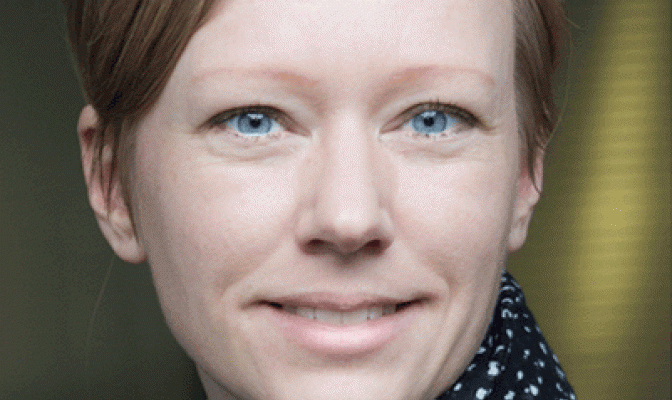
 Jenny Andersson, Crédits Photo : Astrid Dünkelmann/MPIfG
Jenny Andersson, Crédits Photo : Astrid Dünkelmann/MPIfG
Jenny Andersson is the new co-director at the Max Planck Sciences Po Center on Coping with Instability in Market Societies (MaxPo) in Paris. Taking up her work in November 2015, she succeeds former co-director Cornelia Woll and will direct the Center together with Olivier Godechot. Jenny Andersson is an economic historian and CNRS Research Professor at the Center for European Studies (CEE), Paris. She is an ERC Principal Investigator of FUTUREPOL, a Sciences Po project on the political history of the future, knowledge production and future governance in the post-war period. At MaxPo, she will continue her research on the role of the future for economic action and the conditions of political action for a post-crisis age, investigating forms of forecast, scenarios, and future anticipation in extending key forms of interests and value orders into time, and the role of forecasting expertise in this process. She will establish an interdisciplinary research group between history and political science examining the conditions of political action for a post-crisis age, focusing in particular on the effects of austerity on the Left–Right divide.
Jenny Andersson holds a PhD in Economic History from Uppsala University (2003). Before joining Sciences Po in October 2009, she was a post-doctoral fellow and a visiting scholar at the European University Institute, Florence, and at the Center for European Studies, Harvard University. Her dissertation Between Growth and Security: Swedish Social Democracy from a Strong Society to a Third Way about the transformations of the Swedish social democracy after World War II was published in 2006 by Manchester University Press. Her second book, The Library and the Workshop: Social Democracy and Capitalism in an Age of Knowledge, was published in 2009 by Stanford University Press. Jenny Andersson was awarded the CNRS bronze medal for her research in 2015.
Bureaucracy Without Borders

 By Harald Groven
By Harald Groven
Who hasn’t grumbled about red tape? Yet while complaining about bureaucracy is easy, understanding its processes, remits and many facets is less so. From the observation that bureaucratization is a continuous process, Béatrice Hibou, CNRS senior researcher and political economy specialist at CERI Sciences Po, questions the logic behind this development and its political signification. What is bureaucratization? Why and how does it interfere in every aspect of our lives? Can we resist? Béatrice Hibou answers these questions in her book "The Bureaucratization of the World in the Neoliberal Era" published by Palgrave Macmillan. The aim of this book is “ to highlight the present situation (usually analyzed in terms of deregulation, liberalization, privatization, and the smashing of norms) as a product of bureaucratization. This enables us to rethink the different configurations of contemporary neoliberalism” (p.11). In this interview, she gives us a broad outline of her findings.
One might think that neoliberalism marks the end of bureaucratization. Yet in your view, the opposite is true. How do you explain this paradox?
Indeed, neoliberal rhetoric has made the fight against bureaucracy—with its famous “cut the red tape” slogan—one of its main leitmotifs. What I show in this book, however, is that our contemporary world is experiencing an increase in the number of formalities (standards, procedures, rules, categories, etc.), which, if we stop assimilating them to “state administration” and adopt a sociological approach, can be understood in terms of “bureaucracy”. From this point of view, bureaucratization is one facet of neoliberalism.
Specifically, from a sociological point of view, how do you define bureaucracy?
Max Weber is the sociologist who developed this concept the most, after Marx (and contrary to what is often considered, in his continuity rather than as a break). For Weber, bureaucratization is a process of rationalization, characterized by the division of labor, specialization and technical training, and assessment by impartial procedures. It expresses and reflects a need for calculability and predictability specific to industry and adopted by capitalism in increasingly formal and rigorous terms.
Is this phenomenon visible at all levels of society?
Yes indeed. In his analysis, Weber stated clearly that bureaucracy is not only about state administration, but rather that it is “universal”. Weber shows that bureaucracy characterizes modern industry and capitalism, but also associations, churches and political parties.
Hasn’t anything changed since Weber and the early twentieth century?
Yes and no. What is not new is the process of rationalization as such, and its relationship to capitalism. What has changed, it seems, and what I try to show in this book, is that there is an extension of this process to social life in general, since what is not directly linked to capitalism is nonetheless affected by the expansion of norms and procedures. What is new, is that the standards and procedures of the market and managerial firms are considered appropriate whatever the situation or event, and must serve not only the sphere in which they originated (the competitive market, large managerial firms) but also public services and government, entertainment and politics, war and peace, etc.
Your references…
You chose to open the analysis in your book with a clear reference to Alice in Wonderland by Lewis Carroll. Can you tell us more about the analogy you make between the adventures of the girl and the (mis)adventures, or bureaucratic adventures of Alice, a nurse in Paris in the mid 2010s? Is it the “absurd” that links these situations?
Yes, in the first analysis, it is obviously the absurd side of many situations we experience, as embodied by the sequence of Alice's life; at her work, where she spends one third of her time doing anything but medical work, and after work when she struggles with absurd standards that complicate her daily life. Yet there is much more than the absurd in Carroll, there is also the multiplicity of worlds and logics. There are constellations of rationales and divergent interests that explain and enable this process of bureaucratization, which is not only imposed from the top, but also by our own expectations, behaviors and demands. To pursue with the reference to Carroll, I show in my book that behind the world of neoliberal formalities, there is also the world of informalities - which is not formalized following the standards proper to the market and the business community. This is also why the book ends with reference to the “other side of the mirror”!
The theoretical references are also very clear. You offer a meeting point to Max Weber, Michel Foucault and Paul Veyne, to name a few. Was this encounter obvious? Can the works and the tools provided by Weber and Foucault, for example, easily articulate and be combined?
Yes, the meeting was obvious to me and I think for anyone who reads the works of these authors! Today, the contradiction between Marx and Weber is outdated. Recent translations of Weber have undermined many misinterpretations and there are more and more crossroads between Foucault and Weber... At CERI as well as FASOPO, our intellectual tradition refusing orthodoxies, chapels and sectarianism is very much alive since the 1990s.
The title of your book is a clear reference to Bruno Rizzi’s work, "The Bureaucratization of the World", published in the 1930s and considered as one of the most controversial works of the twentieth century. Is your book "The Bureucratization of the World at the Neoliberal Era" a contemporary reading of the questions raised by Rizzi?
As a matter of fact, I would have preferred "The ‘Universal’ Bureaucratization at the Neoliberal Era" since my reference is Weber rather than Rizzi. Yet I fully accept the nod! The idea of a globalization of the process – that Rizzi showed by highlighting the convergence of the United States and Russia as well as Europe – is another major element of my demonstration. The process of a neoliberal bureaucratization can be found everywhere, in Africa, Asia, or Latin America, be it at various degrees.
On the notion of actor…
In your book you show the central role of the actor in the process of bureaucratization as a form of exercise of power. You show that the actors are both the target and the agents of bureaucratization, whether by fighting it or asking for it.
I try to show the ambivalence of bureaucratization. While Alice's adventures highlight the absurd side of applying managerial standards in sectors with other rationalities and principles (in this case, a public service, the health sector), the treatment of poverty or the management of migrants or asylum seekers according to these same models emphasizes another negative aspect of bureaucratization: it is one of the modes and methods of domination, particularly through the production of indifference.
Yet bureaucracy can have its “bright” side, and therefore be desired. Take the example of procedures meant to make actions—public or private—fairer, more transparent, more explicit, quicker to evaluate. Such is also the case when standardization is inextricably associated with modernity and progress, as with the new information technologies; or when the development of procedures and rules is justified by the principle of security, safety and precaution.
In the end, what seems clear is that we are all bureaucrats, and sometimes our own! This was perfectly expressed by Henri Lefebvre, “(…) bureaucracy bureaucratizes the population more efficiently than a dictatorship, integrates people by turning them into bureaucrats (thus training them for the bureaucratic administration of their own daily lives) and rationalizes ‘private life’ according to its own standards.” (Henri Lefebvre, Everyday life in the Modern World, 1971, p. 159.)
On your research path…
This book is a continuation of your previous work on domination, obedience and the continued redeployment of forms of exercise of power. What questions brought you to devote a book to the problem of bureaucracy?
In "The Force of Obedience" about Tunisia and then in "Political Anatomy of Domination", I showed, in a comparative perspective, how domination is not only exercised top-down, by constraint or even by force, but that it is necessarily mediated by the targets themselves, through their needs or expectations, interests, understandings, modes and way of life. In The Privatization of the State, I emphasized how the state redeployed itself despite the impression of withdrawal and powerlessness, a redeployment that was once again mediated by the private sector, networks, etc. In The Bureaucratization of the World in the Neoliberal Era, I crossed these two issues by analyzing the process of bureaucratization both as a form of government and therefore as an efficient dispositif of domination—as already emphasized by Weber—and as a lifestyle, a behaviour characterizing a certain order, and as an expression of an ideology or hegemony, neoliberalism.
To conclude… Is it possible to resist bureaucracy?
Yes, it is possible, although it can often be difficult, if not illusory. To be more precise, I think we can withstand certain forms of bureaucracy (neoliberal bureaucratization), but not necessarily bureaucratization as it is understood in its sociological sense, as a process of rationalization. In the academic world for instance, we can resist neoliberal bureaucratization by refusing to return to quantitative evaluations, or by refusing to fill out forms asking us to assess our production in terms of “deliverables” and other “performance criteria”. This does not mean that it escapes bureaucratization. We can indeed agree to be evaluated by our peers to avoid mandarinat and cronyism in the academic establishment, but according to criteria that come from the world of knowledge, not of business.
Should we resist?
That is a philosophical question, a question of our relationship to the world and to freedom. If one accepts the idea that neoliberal bureaucracy is a form of domination, everyone is free to comply, to resist, or to develop his or her self-will (Eigensinn).
Béatrice Hibou was interviewed by Miriam Perier, CERI Sciences Po.
Transformations in EU Gender Equality

 Transformations in EU Gender Equality, by Sophie Jacquot
Transformations in EU Gender Equality, by Sophie Jacquot
Transformations in EU Gender Equality. From emergence to dismantling
by Sophie Jacquot
Palgrave Macmillan, July 2015
The European Union is considered as one of the most progressive gender regimes in the world. The EU gender equality policy is often defined as 'exceptional'. For almost four decades, an advanced set of norms and values has been imposed on the Member States and the EU has constituted a welcoming environment to women's groups and mobilisations. However, since the end of the 2000s, the EU and almost all its Member States have suffered a lasting economic and budgetary crisis. Within this new context, does the EU still offer a privileged and alternative arena for shaping and implementing an ambitious public policy aimed at promoting gender equality? Based on ten years of research, this book presents a long-term comparative analysis of the transformations of the EU gender equality. It analyses the mechanisms of construction, consolidation, and then deconstruction of the 'exceptionality' of this policy, and questions the effects of its current dismantling
Sophie Jacquot is a researcher at CEE - Sciences Po. She specializes in the sociology of policy analysis and in EU studies. Her research activities are concerned with the transformation of EU public policy and with the effects of Europeanization, especially in the fields of gender equality, social policy and anti-discrimination.
Reviews
"Sophie Jacquot has written a remarkable book that will be read by students of the EU and European politics in general. She provides a dynamic account of the historical evolution of gender equality policy from its humble origins as Article 119 in the Rome Treaty to its central (mainstreamed) status in European policy making today. While she views the EU as a specialized laboratory within which to carry out her study, she is also attentive to the broader conceptual and methodological aspects of policy making, thus making her book cumulative with the research in the field of comparative politics." – James A Caporaso, Professor of Political Science, University of Washington, USA
"This book tells the fascinating story of the evolution and gradual mutation of gender equality policy in the European Union. By identifying causal temporal sequences, Sophie Jacquot tracks down the rise (and perhaps fall into the world of symbols) of gender equality policy, from exception to anti-discrimination and eventually a set of human rights. This research monograph provides profound lessons about the EU identity and the balance between norms, values and markets today." – Claudio M. Radaelli, Director, Centre for European Governance, University of Exeter, UK
"This important book tells it like it is, neither under-estimating the heyday nor gilding the years of decline. Sophie Jacquot follows the story of the EU's policies and politics promoting gender equality, tracing their innovative beginnings, their zenith, and their slow but steady dismantling. This perceptive and empirically rich analysis is a must-read for practitioners and scholars alike." – Jane Jenson, Chair in Citizenship and Governance, Political Science, Université de Montréal, Canada

